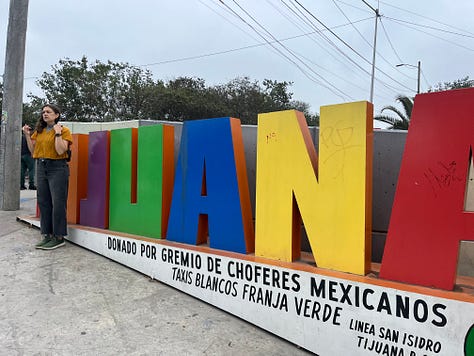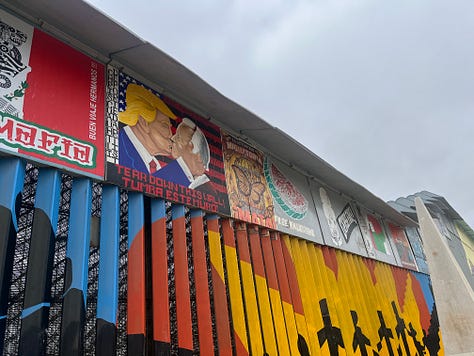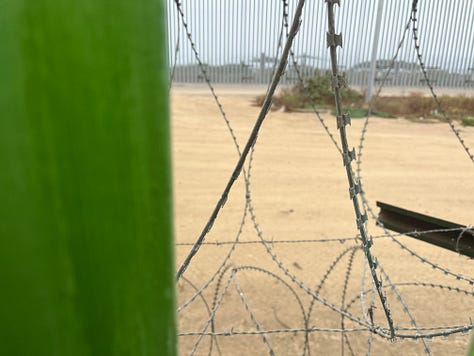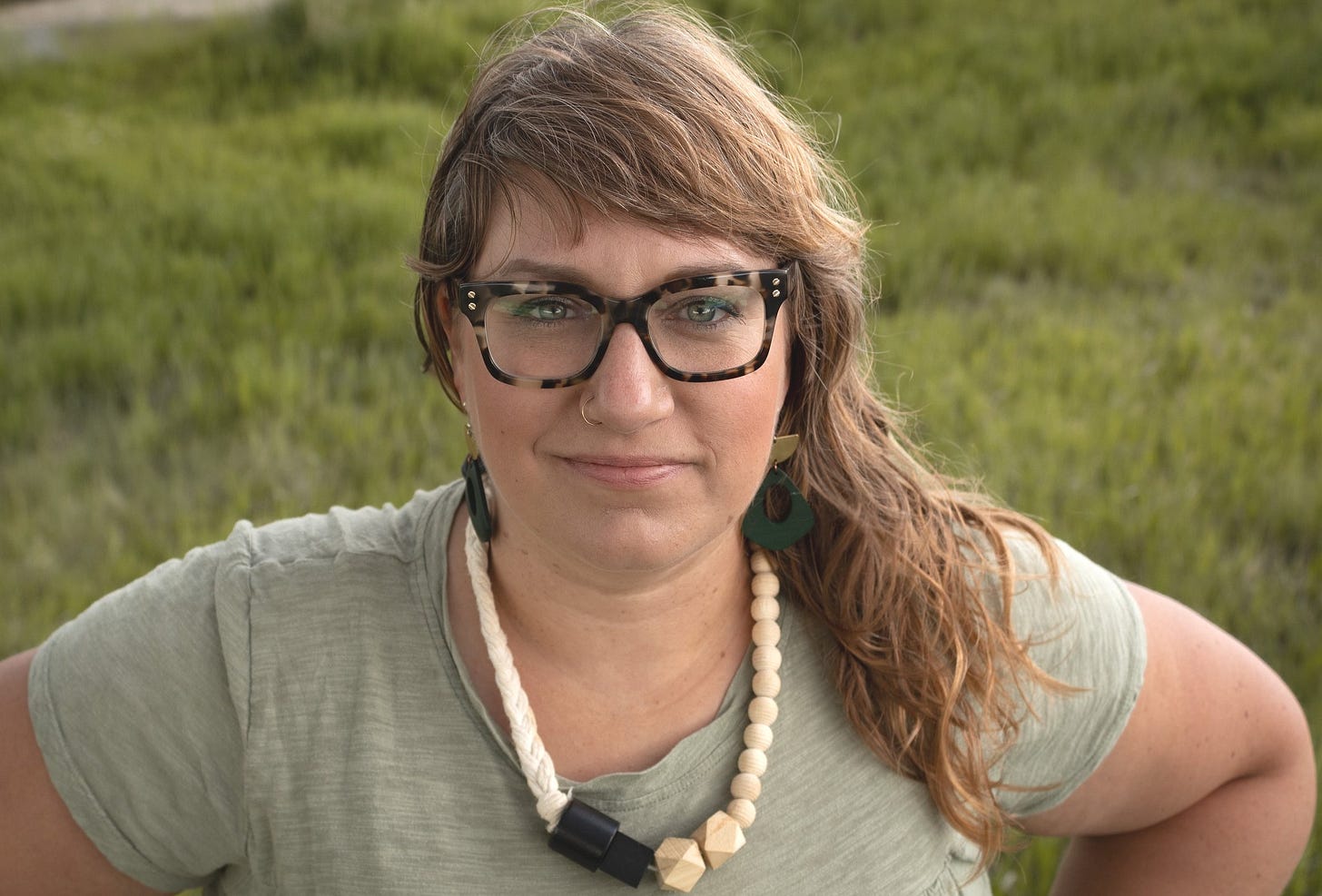the Empathy List #160: What good does protest do?
Historians would like a word.
Hi friends, Liz here.
I’ve been haunted by historians lately.
Last October, I attended Theology Beer Camp, and Kristin Du Mez and Robert P. Jonestold us from the stage that Trump would win and Harris would lose. (Jemar Tisby, PhD said the same on his Substack, if I remember correctly). I didn’t believe their predictions—I couldn’t. Not until a month later, when I sat on a friend’s couch, watching states tally the election results in between Colorado Rapids plays (hockey), did I understand. With my jaw in my lap, I realized that the historians had called the election before anyone else.
That same month, I picked up Timothy Snyder’s On Tyranny, and a few months later, William Zinn’s A People’s History of the United States. Snyder paints a bleak picture of waning democracy as authoritarianism threatens and overtakes European countries in earlier eras, while Zinn reveals how capitalism has always been the greatest authoritarianism threat to our nation’s democracy. (Zinn’s history is more of a socialist, protest history of the United States, making those who lived on the underside of our economic system the protagonists of the American story. I needed that corrective!)
As I read these works, what alarmed me the most was my own naiveté. I thought I had understood the depth of America’s history, and in fact, I had been insulated by my own privilege. It was time to decolonize my politics.









This past August, I spent time at San Diego’s border port of San Psidro, crossing on foot from San Diego to Tijuana, and back again.
Over those two days, I witnessed the same blatant disregard for the law within Border Patrol and Customs agents that we’ve seen ramp up in Chicago. Agents were defensive, they refused to allow any immigrants to claim asylum (including physically blocking them from walking into ports of entry to legally ask for asylum in the first place!), and they sought to make the process of border-crossing as unpleasant and intimidating as possible, even for us citizens.
(I will publish a travelogue of the experienced in the Christian Century magazine within the next year, but no pub date on that yet.)
Worse, at Trump’s request, the border wall that I saw with my own eyes had been lined with razor wire—literal razors that stuck out of curled barbed wire, wound into the barrier between our countries—presumably to catch and rip the skin of any immigrant who got too close. When Trump deployed the National Guard in San Diego, their task was to place this wire on the border wall.
Contractors under Trump’s orders have also raised the American side of the wall to 30 feet. Why? Because when a migrant climbs the wall and falls from that height, they won’t just break bones, but become permanently disabled or will actually die, and thus will be unable to enter the United States ever again. Hopefully this will do double-duty and discourage others from traveling the same hazardous route.
What I mean to say is, the cruelty at the United States border shocked me.
And not only that—this entire Trump administration has shocked me.
I am a white American citizen, and before this year, I still believed the positivist lie that America was ultimately country of law and order. Justice would prevail in our justice system—checks and balances, congressional oversight, judicial independence, etcetera, etcetera.
The worst of American history was behind us, and before us stretched unending democracy.
Even the events that caused the Black Lives Matter protests in 2020 seemed a derivation to me—because, remember, the insurrection of January 6th had resulted in many convictions. Trump himself faced judgment in court after his first term. In fact, I can recite a list of American evils from the deep past that I assumed, mostly, to have been resolved:
the Jacksonian Indian Removal Act and the extermination of indigenous peoples and their sovereignty,
the rise of the Klu Klux Klan and mob justice during Reconstruction,
the federal imprisonment of activists during the Wilson administration,
the cultural and sexual censorship under McCarthyism and the accompanying Lavender Scare.
The most embarrassing evils committed by my government and countrymen had occurred exclusively within the deep past.
We had reached a moral summit. Now, finally, we were colorblind, enlightened, inclusive, pluralist, globalist, and most importantly, not like our grandparents. We had learned our lessons from the past. Perhaps we had opened the door to utopia, after all. (See: Barak Obama as the first black man to be President, ABOUTDAMNTIME.)
In fact, we have made progress since those days. Yet before the Trump administration’s second term, I confess that I felt apathetic about politics because some part of me assumed I would have no role to play. In fact, I assumed that the play had, essentially, concluded.
Well.
Timothy Snyder (AND EVERY SINGLE HISTORIAN) would like a word.
As Snyder states in the epilogue to his chart-topping book, democracy is not a stable, static reality of my nation, as I had once believed it to be.
“Until recently, we Americans had convinced ourselves that there was nothing in the future but more of the same. We allowed ourselves to accept the politics of inevitability, the sense that history could move in only one direction: toward liberal democracy.”
He states that many Americans seemed to accept the fall of the Soviet Union in 1991 as “the end of history.” The end of dictatorial communism had ushered us into a sort of political retirement, with democracy forever ascending and the traumas of fascism, dictatorship, and genocide in the deep past.
Here lies the end of activism, our elders seemed to tell us. But in accepting this premise, Americans “lowered our defenses, constrained our imagination, and opened the way for precisely the kinds of regimes we told ourselves could never return.”
So then, when a leader—say, like our current president—entered, dragging with him populist policy, factual confusion, and unrestrained oligarchy, trying his damndest to abolish the basic tenants of a democratic state (like due process, free speech, the right to assemble, and freedom of religious expression), we are tempted to extend the inevitability further. We can find ourselves assenting to the leader’s political narrative without realizing it, even when we disown the leader himself.
Snyder explains, “If you once believed that everything always turns out well in the end, you can be persuaded that nothing turns out well in the end.”
Political nihilism lies at the base of a belief in perpetual democracy, just as political nihilism lies at the base of belief a democracy’s inevitable decline. In both scenarios, an individual actor accepts that they have no meaningful power to change the nation’s direction.
Our government turns into an abstraction, too big to steer. If government is an untouchable utopian ideal, then it can also become an untouchable nightmare. And in that case, we may ask ourselves, what good does protest do when we hold so little power? Yet if we imagine “democracy” as disembodied and abstract, then we cede our responsibility to each other.
In fact, government lives in our bodies because politics describes how we live together. Democracy is just a word that defines an equitable way to live together as neighbors.
If we see politics as bodies and voices joining together in the communal effort toward a good life, then our individual actions do matter. Speaking up for a neighbor at a town hall tells that specific neighbor that, to at least one person in their community, she matters. Calling a senator gives the politician a real-time report card from one IRL citizen using her voice. Canvassing can humanize the side you represent to the person on the other side of the door, and when you meet a neighbor who disagrees with you, a neighbor who may fear the picture of your demographic that a politician has painted, well then, demonstrating your humanity, that you are not evil, that you and your neighbor have more commonalities than differences, that disproves the rhetoric of their politicians in real time with more efficacy than any political advertisement could.
Your neighbor is not the enemy, and you are not your neighbor’s enemy, and we can work together to make our communities healthier for everyone. That is democracy at its purest.
No, you can’t rewrite laws by yourself, you can’t depose corrupt politicians single-handedly, and you can’t fact-check the information spewing from the liar’s mouth with enough umph to make it stick in the minds of your (my) in-laws.
But you can say no, and you can say no in community. And that no matters.
When I say I have been feeling the need to “decolonize” my politics, I mean that I need to decenter the white narrative of our national history. I need to understand politics from the perspective of those who have suffered under the policies enacted by my european ancestors.
I’m seeking to learn from the political history and activism of African Americans and other minorities, in particular, whose ongoing struggle for civil rights can offer truer perspective on this political moment in our nation.
And according to historians of the Civil Rights era, protest is essential to achieve progress. Yet the efficacy of protest movements cannot be judged in terms of days or weeks, but years and decades.
As Gloria J. Browne-Marshall—another historian—told NPR reporter B.A. Parker, reflecting on her book A Protest History of the United States, she sees protestors resisting that slow movement:
“There’s an impatience. [We have the attitude that] this is the 21st century. People don’t want to re-protest what was already protested and won, you know? So consider the Montgomery bus boycott was in 1955. We gained the civil rights legislation in 1964 and the Voting Rights Act in 1965.
So many lives were lost [in those protests]. So many people were assaulted. So many protests happened during that time period of 1955 to 1965. But [today we] want the TV version…
NPR Reporter: Some protests happened, and it was all done, and it was fixed.
Browne-Marshall: And it was all done [back in] 1965.
NPR: I saw that movie.
Browne-Marshall: Yeah. You saw the movie “Selma.”
As she points out, the fact that folks protested in the past does not mean protest does not need to continue into the future. In fact, seeking justice requires continued commitment to protest movements, and to participate over the long-term, activists must cultivate resiliency.
“[Progress] is something that’s two steps forward, one step back, but it’s two necessary steps - necessary - or else you’re always going backwards. That’s why it’s so important to understand that protest is a necessary part of our work.I think we need to think about and look at the future. And are we going to be freedom freeloaders, or are we going to invest in a future in which there are people who gain rights and protections based on our work, the same way we gained them based on other people’s work?
In other words, yes, this moment is scary. But we must continue to tell the truth, demand justice, and show kindness to our neighbors because those actions matter. So does the work of protest over a weekend, even more so, the work of protest over a lifetime.
As Browne-Marshall points out, African American activists have made notable cultural and political progress over the decades since the Civil Rights movement, progress that even this administration has not been able to undermine—progress that enfranchised black voters in the South, made lynching culturally unacceptable and illegal (mostly—I know that black deaths still happen and that the perpetrators are not always held accountable!!), and caused the national parties to seek ways to make elections fairer.
Sure, the administration hasn’t finished yet, and much can happen in three years. But I urge us to learn from the good work of our black neighbors who chose justice over the long-haul.
What does it look like to admit the truth of how scared we are, and yet to hold hope for the future? I don’t know. But I am seeking to learn to hold my fear and hope in tension. (What other choice do we have?) After all, fear is not the enemy, and neither is hope.
Thanks for reading, my friends.
Warmly, Liz Charlotte Grant
Tell me: what scares you about this political moment? What gives you hope?




